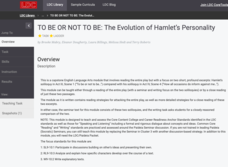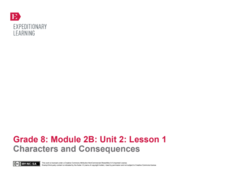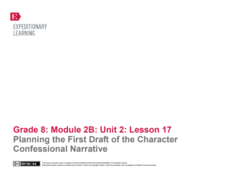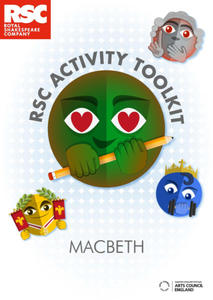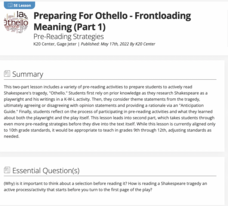EngageNY
Grade 9 ELA Module 1: Unit 3, Lesson 20
The final session in this 20-lesson plan unit asks individuals to use their Quick Writes, discussion notes, worksheets, and annotated text to craft and support a claim about how Shakespeare develops either Romeo or Juliet as tragic heroes.
Literacy Design Collaborative
Macbeth: Influence of Supernatural
Something wickedly wonderful this way comes in a instructional activity that focuses on Macbeth. After a close reading of the play, class members craft a literary analysis essay in which they use evidence from the text to show how...
Literacy Design Collaborative
To Be or Not to Be: The Evolution of Hamlet’s Personality
How does Hamlet's state of mind change over the course of Shakespeare's most famous revenge tragedy? After a close reading of Hamlet's soliloquies in Act III, scene 1 and Act IV, scene iv, class members engage in a Paideia/Socratic...
Literacy Design Collaborative
Rethinking Ophelia
How can a gender theoretical lens shape the way Ophelia is perceived in Hamlet? That is the question writers must answer in an explanatory essay to conclude their study of Shakespeare's revenge tragedy.
EngageNY
Analyzing Character and Theme: Tracking Control in A Midsummer Night’s Dream
Pupils first participate in a drama circle as they continue reading Shakespeare's A Midsummer Night's Dream aloud with classmates. Next, scholars move around and discuss text-dependent questions about the play with a Three Threes in a...
EngageNY
Launching A Midsummer Night’s Dream: Identifying the Characters, Settings, and Conflicts
Scholars form a drama circle and begin reading Shakespeare's A Midsummer Night's Dream. They also use a play map to identify the setting, characters, and conflicts from the text.
EngageNY
Characters and Consequences
Scholars consider how dialogue reveals aspects of a play's characters as they read Shakespeare's A Midsummer Night's Dream and complete a written conversation note-catcher. Additionally, pupils participate in an I Have/Who Has jigsaw...
EngageNY
Analyzing Character and Theme: Tracking Control in A Midsummer Night’s Dream
Scholars examine how characters try to control one another in Shakespeare's A Midsummer Night's Dream. They engage in a read-aloud and class discussion to iron out ideas. They also work in small groups to complete a note-catcher...
EngageNY
Analyzing the Resolution of the Play: World Café Discussion
It's time to get active! Scholars participate in a World Café protocol to promote discussion and leadership. They leave their seats and move from group to group to discuss critical questions related to their read-aloud of Shakespeare's A...
EngageNY
Leaving the Play: All’s Well That Ends Well
How does Shakespeare develop the theme of control in A Midsummer Night's Dream? Using the resource, scholars analyze the theme of parental control in the play and the Greek myth "Pyramus and Thisbe." Next, they talk to partners to...
EngageNY
Analyzing the Model Essay: Studying Argument
Scholars begin writing an argument essay based on Shakespeare's A Midsummer Night's Dream. They read and analyze a model essay, considering the author's thinking before writing it.
EngageNY
Writing an Argument Essay: Evaluating the Model and Crafting a Claim
Pupils prepare to write argumentative essays based on Shakespeare's A Midsummer Night's Dream. They begin weighing evidence and crafting claims for their writing about control.
EngageNY
Writing an Argument Essay: Planning the Essay
Pupils use a helpful resource to begin a Writing Improvement Tracker, developing awareness of their writing strengths and challenges. Additionally, they continue planning their argument essays about Shakespeare's A Midsummer Night's...
EngageNY
End of Unit 2 Assessment, Part 1:Drafting the Argument Essay
An informative resource instructs pupils on how to write their essay drafts about the theme of control in Shakespeare's A Midsummer Night's Dream. Next, scholars complete an Exit Ticket, listing their three favorite characters from the...
EngageNY
Planning the First Draft of the Character Confessional Narrative
Scholars read and analyze a model character confessional narrative to help guide their writing. Then, they plan the first draft of a character confessional based on Shakespeare's A Midsummer Night's Dream.
EngageNY
Launching the Performance Task: Prompt, Characters, Groups
Scholars unpack the word confession as they prepare to write confessionals based on characters from Shakespeare's A Midsummer Night's Dream. Next, they read their narratives to a small group of peers as part of a final performance task.
EngageNY
End of Unit 2 Assessment, Part 2: Revise Essay Drafts
Time to revise! Scholars revise their argument essays based on Shakespeare's A Midsummer Night's Dream using feedback from their teacher and peers. They begin their revisions after reviewing a mini-lesson plan on proper writing conventions.
Royal Shakespeare Company
RSC Activity Toolkit: Macbeth
Are you looking for great activities to incorporate in a unit study of the Scottish play, Macbeth? You need not prick your thumb leafing through pages of ideas; instead, something marvelous your way comes in a 20-activity toolkit from...
Royal Shakespeare Company
King Lear Teacher Pack 2010
Every production of Shakespeare's plays is different—the director and designer must decide upon a theme. For his 2010 production, David Farr and his team decided to emphasize the conflicts that follow a regime change. The materials in a...
Royal Shakespeare Company
RSC Activity Toolkit: The Merchant of Venice
Mercy! It's a wise teacher that knows their own students and what they need to appreciate Shakespeare's Merchant of Venice. A 28-page tool kit ensures that every scholar will play a part. The kit is divided into 20 sections, each of...
Livaudais-Baker English Classroom
Background to Othello
Provide readers of Othello with information that will support their study of Shakespeare's tragedy. The 36 slides include background information about the themes, plot, characters, setting, and literary terms and devices used.
K20 LEARN
That Which We Call a Rose: Connotation and Denotation in Romeo and Juliet
Words carry weight. And some words carry baggage. Scholars learn the difference in a study of connotation and denotation. Individuals sort the cards into three groupings using words from Shakespeare's play. After sharing within groups,...
K20 LEARN
Preparing for Othello - Frontloading Meaning (Part 1): Pre-reading Strategies
The success of any lesson based on a complex text relies heavily on what instructors do before beginning the reading. Before reading Othello, scholars engage in a series of pre-reading activities, including completing an anticipation...
Novelinks
The Winter’s Tale: Problematic Situation
Before beginning The Winter's Tale groups read and discuss a scenario that parallels the plot of Shakespeare's play. They then brainstorm possible solutions to the problem.
Other popular searches
- Life of William Shakespeare
- William Shakespeare Quotes
- Who Was William Shakespeare
- Poetry William Shakespeare
- William Shakespeare Bio
- William Shakespeare Biography




